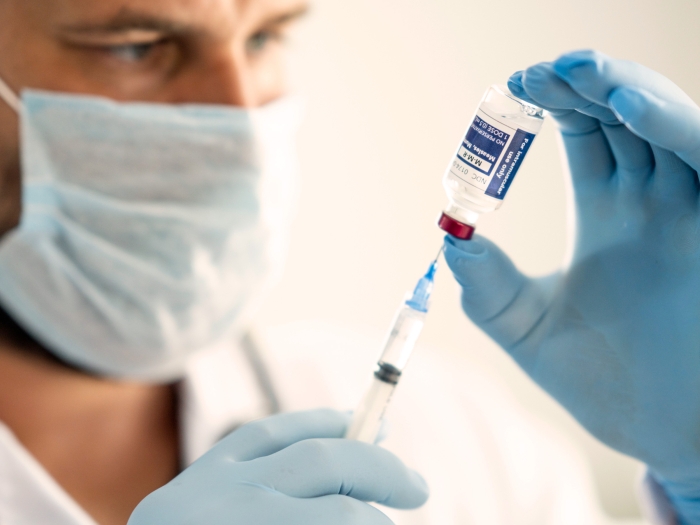A blood clotting expert explains the J&J vaccine pause.
10:21 AM
Author |

The Centers for Disease Control and Prevention and the Food and Drug Administration on April 13 recommended that providers pause on giving out the Johnson & Johnson/Janssen COVID-19 vaccine.
It comes after six women who received the vaccine experienced blood clots in the brain within two weeks after vaccination, and after more than 6.8 million people in the United States received the one-dose COVID-19 vaccine.
Geoffrey Barnes, M.D., M.Sc., a cardiologist and vascular medicine specialist at the Michigan Medicine Frankel Cardiovascular Center, weighs in.
What is your take on the concerns about blood clotting after the Johnson & Johnson/Janssen vaccine?
Barnes: It's important to note that we do not yet know if there is a real risk of clotting associated with the J&J/Janssen vaccine. So far, there are very few reported cases (six) despite millions of doses administered. However, given the events in Europe and Canada that appear to be associated with the AstraZeneca vaccine (which is not currently available in the U.S.), I think it's wise to pause to investigate these cases.
There has been a specific mechanism proposed for the rare clotting events after the AstraZeneca vaccine, and we don't yet know if the same mechanism might be involved with these clotting events found after the Janssen vaccine.
Like Podcasts? Add the Michigan Medicine News Break on iTunes, Google Podcast or anywhere you listen to podcasts.
What should people who have already gotten the Johnson & Johnson/Janssen vaccine know?
Barnes: Keep an eye on how you're feeling. Clinicians and patients should watch for any signs or symptoms that can signify a clot within 1-3 weeks after the AstraZeneca or J&J/Janssen vaccine. Those may include severe headache, vision changes, severe abdominal pain, or nausea and vomiting.
Notably, if patients develop muscle aches, chills, or nausea and vomiting within 1-2 days after the vaccine, that is likely a known side effect of the vaccine and not related to a clot. But if these develop 4-5 days after the vaccine, patients should be evaluated for a possible rare blood clot.
If a patient does develop signs or symptoms of a clot within three weeks after an AstraZeneca or J&J/Janssen vaccine, evaluation with routine coagulation tests and imaging is recommended. If thrombocytopenia (low platelets) are found, work up for vaccine-induced thrombotic thrombocytopenia (VITT; similar to heparin-induced thrombocytopenia) and avoiding heparin anticoagulation is recommended until further testing can be completed.
What should you do if you already have an appointment for this vaccine?
Barnes: Check with the place you're registered with to see if they're pivoting to other vaccine manufacturers or if you'll have to make a later appointment.
But you can also develop blood clots if you get COVID-19, right? Should we be worried about both?
Barnes: Patients who develop COVID and get hospitalized are at risk for developing blood clots as well. The risk of blood clots in patients with COVID is far higher than the very small risk of a blood clot following a COVID-19 vaccine. Overall, the benefits of COVID-19 vaccination greatly outweigh the very small risks.
What other common medications do we take that give us a risk of blood clots?
Barnes: Many women use estrogen-containing oral contraceptive pills. These pills are associated with a risk of blood clots, including the rare clots that have been seen with the AstraZeneca vaccine.
What is the final message you'd like readers to know?
Barnes: COVID-19 is a serious public health crisis. Vaccines are a critical element to getting the pandemic under control.
The blood clots identified after the AstraZeneca and Janssen/Johnson & Johnson vaccine are concerning, but seem to be quite rare. For AstraZeneca, the awareness of this condition and how to diagnose and treat it rapidly was disseminated across Europe and Canada. After today, I believe we'll see the same happen across the U.S. in relation to the Janssen/Johnson & Johnson vaccine because of what we've learned through their experiences.
Furthermore, there has not been a sign of blood clot risk following the Pfizer or Moderna COVID-19 vaccines. Therefore, I strongly urge everyone to get vaccinated as soon as possible.

Explore a variety of healthcare news & stories by visiting the Health Lab home page for more articles.

Department of Communication at Michigan Medicine
Want top health & research news weekly? Sign up for Health Lab’s newsletters today!





